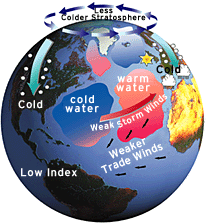I was going to add this as a comment to
Jeff's post below, but it kept getting larger and larger, far beyond the 1000 character limit. So it got its own headline. See the above link to Jeff's post if it should drop off the page before this one does...
To quip, judicial activism is just judicial review when the results don't go your way. A ludicrous example is
this editorial from the WSJ, in which Justice O'Connor is accused of judicial activism for
upholding the McCain-Feingold Bill and for
upholding the use of race in admissions by the University of Michigan. Our own views in these particular issues don't matter, but the politically motivated accusation of judicial activism is telling. In both cases, the Court by definition exercised judicial restraint, and yet an unpopular ruling was called "activism".
US history is replete with examples of both conservative and progressive judicial review - yet there are good arguments to be made against judicial review in general.
Some links:
Why Judicial Review is Bad
Judicial Review and the Supreme Court
The Reader's Companion to American History - Judicial Review
Of interest to some, John Adams (writer of Mass. Constitution, second POTUS) was the first president to "abuse" the judicial system by signing a law creating many new federal court positions just before he left office, intent to fill these new positions with Federalist judges in order to stymie the new Republican Congress and President. When Jefferson came into office, his Democratic-Republicans repealed the Judiciary Act of 1800 that Adams had signed. This led, in 1803, to the case
Marbury vs. Madison in which the Supreme Court first established the power of the Supreme Court to declare an act of Congress unconstitutional (by invalidating a section of the Judiciary Act of 1789).
I am certainly no expert on this or any legal issues, but there seems to be a fundamental problem.
The Judiciary, filled with judges largely appointed for life, have since the 1803 decision, made themselves the arbiters of constitutionality. This is a potentially a problem because they are not accountable to the people.
However, the Legislature and the Executive, while accountable to the people, can not be trusted to determine when their own actions (since they are the only branches of government that have active power, e.g. purse and means) are unconstitutional.
Nor can we necessarily trust the people themselves to decide constitutionality, in order to prevent tyranny of the majority over the minority's fundamental rights (although some argue that this is exactly what we should do, depending on negotiation between multiple factions to somehow magically guarantee minority rights).
It seems evident that problems will arrive that had not been considered when the constitutions were written. The problem cannot be treated as outside the constitution (the ultimate law of the land), so the existing constitution and intent of the constitution's framers must be interpreted in order to be applicable to the problem case. The judiciary has been and will continue to be presented with cases for which there is no clear constitutional rule because the specific problem had never been considered before.
The issue that presents itself here is that, whether the majority of society approves or not, laws banning (or not-allowing-for) same-sex marriages may indeed be unconstitutional (at a state or federal level). In a similar fashion, Amendment 14 of the US Const. provided for equal protection under the law of all US citizens. This was later used to invalidate popular (at state level), although unconstitutional (by Supreme Court decision), Jim Crow laws.
It seems to me that if banning same-sex marriages is truly unconstitutional (at state or federal level), then constitutions must be amended by popular favor to eliminate same-sex marriage, regardless of the difficulty. Until that time, the law should allow for them.
So no answers here. Smarter people than I haven't been able to figure it out. Judicial review in support of unpopular ideas may very well cause backlash, damaging the very causes the judges support. I suppose that the issue of judicial activism may be self-correcting, although on a slow time scale. As executives and legislatures (responsible to the people) become frustrated with "activist" judges, they will appoint and approve fewer activists to the bench, and the pendulum will swing back to judicial "restraint" as activist judges die out. The judiciary can also reverse it's own decisions , although a change in membership would typically be required.
 I wouldn't usually advertise for someone else, but this is a funny t-shirt!
I wouldn't usually advertise for someone else, but this is a funny t-shirt!
 ...when "Climate change over the next 20 years could result in a global catastrophe costing millions of lives in wars and natural disasters"?
...when "Climate change over the next 20 years could result in a global catastrophe costing millions of lives in wars and natural disasters"?
 In 1978, Masahiro Mori discovered "The Uncanny Valley Effect" relating human emotional responses to human-like artificial creations. Roger Ebert
In 1978, Masahiro Mori discovered "The Uncanny Valley Effect" relating human emotional responses to human-like artificial creations. Roger Ebert  Dutch researchers have found a link between migraine headaches and the presence of brain lesions. CNN article
Dutch researchers have found a link between migraine headaches and the presence of brain lesions. CNN article 






